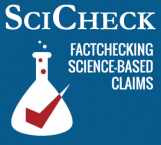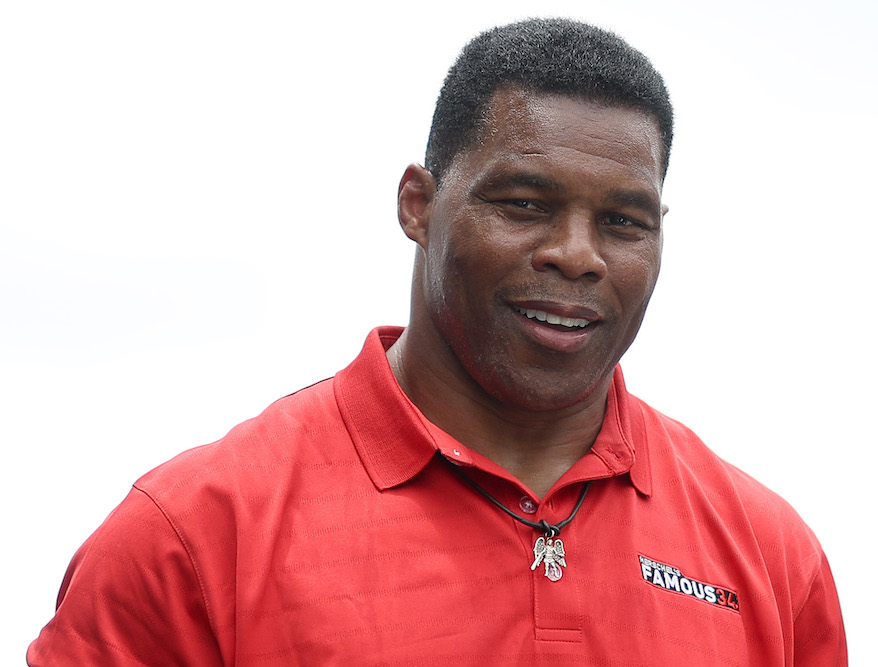In speaking about the Green New Deal, Herschel Walker, the former professional football player vying for a Senate seat in Georgia, incorrectly suggested that U.S. climate efforts were pointless because “China’s bad air” would simply move over into American “air space.”
While some forms of air pollution are largely local problems, which sometimes can travel to other places, greenhouse gases — the emissions relevant to climate change — mix in the atmosphere and therefore are shared globally. If the U.S., which is the second-largest emitter of greenhouse gases, substantially reduced its emissions, it would be beneficial to America and the rest of the world.
“We in America have some of the cleanest air and cleanest water of anybody in the world,” Walker, a Republican, said on July 9 at a campaign event in Hall County, Georgia, after promising to explain the Green New Deal and climate change to the audience (his comments begin about 24 minutes in).
 Under the Green New Deal, he said, the U.S would spend “millions of billions of dollars cleaning our good air up. … Since we don’t control the air, our good air decided to float over to China’s bad air so when China gets our good air, their bad air got to move. So it moves over to our good air space. Then now we got to clean that back up, while they’re messing ours up.”
Under the Green New Deal, he said, the U.S would spend “millions of billions of dollars cleaning our good air up. … Since we don’t control the air, our good air decided to float over to China’s bad air so when China gets our good air, their bad air got to move. So it moves over to our good air space. Then now we got to clean that back up, while they’re messing ours up.”
“So what we’re doing is just spending money,” he continued. “Until these other countries can get on board and clean what they got up, it ain’t going to help us to start cleaning our stuff up. We’re already doing it the right way.”
Walker’s comments are reminiscent of those of former President Donald Trump, who has also previously conflated traditional pollutants with greenhouse gas emissions and repeatedly touted the nation’s air and water quality. Trump endorsed Walker, who is trying to unseat Democratic Sen. Raphael Warnock, in September.
Emissions of greenhouse gases, primarily carbon dioxide, are responsible for climate change — and the U.S. is one of the worst offenders. According to Climate Watch, in 2019, the most recent year with available data, the U.S. was the second-highest emitter of greenhouse gases, behind only China — and alone responsible for 12% of the world’s emissions. The U.S. was also the highest emitter per capita.
So the U.S. is not, as Walker claimed, “already doing it the right way” in terms of greenhouse gases.
In terms of air and water quality, the U.S. isn’t exactly the best, either. According to the 2022 Environmental Performance Index, which is put out by Yale and Columbia universities, the U.S. ranks 16th in air quality and 23rd in drinking water.
It’s true that some traditional air pollution does travel from Asia to the U.S. Several studies have found that pollutants from China and other countries can drift over the Pacific, contributing to smog and other air quality problems in the western U.S. Some of this pollution is due to products Americans import, since the manufacturing has been outsourced.

But Walker’s description of how that international transfer works is wrong, as the U.S. does not actively “clean” air like a filter, nor does “bad” air move in to displace “good” air or vice versa. Strong global winds called “westerlies” are the reason why air pollutants in China and other parts of Asia make their way to the U.S. Air is generally cleaner in the U.S. than in China because pollution is stopped at the source and is never released in the first place, in large part due to regulations imposed by the Clean Air Act.
The “way countries and regions improve their air quality is by reducing emissions of criteria pollutants,” such as those defined by the Clean Air Act, Steven J. Davis, a professor of Earth system science at the University of California, Irvine, told us in an email.
Davis is a co-author of a study published in PNAS that found in 2006 that as much as 12% to 24% of sulfate pollution over the western U.S. was due to export-related Chinese air pollution. There “can be inter-regional transport of air pollution across long distances, but air pollution doesn’t displace clean air,” he added. “It’s more like pee in a swimming pool: it dissipates and becomes less concentrated over dimensions of time and space, but no one is better off because of it.”
In any case, Walker invoked climate change and the Green New Deal, the main goal of which is to reach net-zero greenhouse emissions in a decade, in his description — not traditional air pollutants. (The Green New Deal, as we’ve written, is a nonbinding resolution introduced in Congress in 2019 that lays out a broad vision for how the country might tackle climate change over the next decade. It never advanced out of the Senate.)
And from that perspective, Walker’s description also is incorrect. Greenhouse gases, which include carbon dioxide, methane, nitrous oxide and other fluorinated gases, accumulate in Earth’s atmosphere as a result of human activity, particularly the burning of fossil fuels, which traps heat from the sun and warms the planet.
“Each of these gases can remain in the atmosphere for different amounts of time, ranging from a few years to thousands of years,” the Environmental Protection Agency has explained. “All of these gases remain in the atmosphere long enough to become well mixed, meaning that the amount that is measured in the atmosphere is roughly the same all over the world, regardless of the source of the emissions.”
“There can be enhanced concentrations near point sources and urban areas, but the levels of atmospheric CO2 over the US aren’t drastically different than over China,” Davis said in an email, referring to carbon dioxide. He noted that in April 2020, carbon dioxide levels over China and the U.S were within three to four parts per million of each other.
In other words, there is no American “good air” or Chinese “bad air.” When it comes to greenhouse gases, everyone ultimately shares the “air” — and the concentration of heat-trapping gases in the atmosphere is increasing. This is raising the global average temperature, which is also causing other effects, such as sea level rise, ice melt and more extreme weather.
About 40% of carbon dioxide emissions remain in the atmosphere, according to the University Corporation for Atmospheric Research, while 30% is taken up by plants through photosynthesis, and another 30% is absorbed by the ocean. Excess carbon dioxide in the ocean leads to ocean acidification, which can negatively affect sea creatures and ecosystems, as the National Oceanic and Atmospheric Administration has explained.
Walker’s campaign did not respond to our request for comment, but did release a statement following criticism of his remarks that attacked his opponent, Warnock. The statement claimed that Walker had “called out China for being the world’s number one polluter,” even though Walker never explicitly did so.
At the same event, Walker also claimed, without evidence, that SARS-CoV-2, the virus that causes COVID-19, was “created by China.” As we’ve written, while the origin of the coronavirus remains unknown, there is no evidence the virus leaked from a lab, and some experts say it’s virtually impossible for the virus to have been bioengineered.
According to reporting by Georgia Public Broadcasting, Walker’s inaccurate pollution remarks have been repeated in various forms and are a part of his stump speech.
“No matter how much money we put into controlling our air, it goes over to China or to somewhere else, and it messes it up,” Walker said at an event in Statesboro, Georgia, in May. “All of a sudden, it comes back over here.”
As we’ve established, whether he’s referring to standard criteria air pollutants or greenhouse gas emissions, that’s not how air pollution works — and reducing greenhouse gas emissions would be beneficial both to the U.S. and to the global community.
Editor’s note: FactCheck.org does not accept advertising. We rely on grants and individual donations from people like you. Please consider a donation. Credit card donations may be made through our “Donate” page. If you prefer to give by check, send to: FactCheck.org, Annenberg Public Policy Center, 202 S. 36th St., Philadelphia, PA 19104.